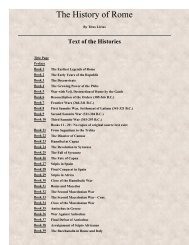Types in Hebrews - Table of Contents - Holy Pig Splash Page
Types in Hebrews - Table of Contents - Holy Pig Splash Page
Types in Hebrews - Table of Contents - Holy Pig Splash Page
You also want an ePaper? Increase the reach of your titles
YUMPU automatically turns print PDFs into web optimized ePapers that Google loves.
and the Redeemer. For we are but men — weak and s<strong>in</strong>ful men, who need not only mercy and help, but<br />
sympathy. But there is no such gulf. For though He is "the effulgence <strong>of</strong> the glory (<strong>of</strong> God) and the very<br />
image <strong>of</strong> His substance," and upholds all th<strong>in</strong>gs by the word <strong>of</strong> His power, He came down to earth, to<br />
take part <strong>of</strong> flesh and blood, to live as a man among men, and to die a shameful death at the hands <strong>of</strong><br />
men. And hav<strong>in</strong>g thus been "made perfect through suffer<strong>in</strong>g," He has become "a merciful and faithful<br />
High-priest <strong>in</strong> th<strong>in</strong>gs perta<strong>in</strong><strong>in</strong>g to God." 5<br />
And yet we must not overlook the special sett<strong>in</strong>g <strong>in</strong> which this wonderful truth is here revealed. The<br />
Apostle Paul was div<strong>in</strong>ely commissioned to unfold the great characteristic truths <strong>of</strong> Christianity - "grace,<br />
salvation-br<strong>in</strong>g<strong>in</strong>g to all men," and Christ "a ransom for all." But they must have a strange conception <strong>of</strong><br />
what <strong>in</strong>spiration means, who can cavil because these truths have no place <strong>in</strong> <strong>Hebrews</strong>. For here we have<br />
to do, not with the children <strong>of</strong> Adam, but with "the children <strong>of</strong> Abraham," who is the father <strong>of</strong> all<br />
believers. Nor are we told how lost s<strong>in</strong>ners can be saved, but how saved s<strong>in</strong>ners on their way to rest can<br />
be "made perfect <strong>in</strong> every good work to do His will."<br />
The glorious truth <strong>of</strong> the love <strong>of</strong> God to a lost world must not be limited by the teach<strong>in</strong>g <strong>of</strong> <strong>Hebrews</strong>,<br />
neither must the truth revealed <strong>in</strong> <strong>Hebrews</strong> be frittered away by ignor<strong>in</strong>g its special mean<strong>in</strong>g. In a sense<br />
the Lord has taken up the seed <strong>of</strong> Adam, but not <strong>in</strong> the sense <strong>in</strong> which, <strong>Hebrews</strong> tells us, "He taketh hold<br />
<strong>of</strong> the seed <strong>of</strong> Abraham." For though God loves the world, He loves His own the best; and "the children"<br />
<strong>in</strong> <strong>Hebrews</strong> are not the Adamic race, but the children <strong>of</strong> the promise, the children <strong>of</strong> God. And these, and<br />
these alone, it is that the Lord here calls His brethren. 6 Many a Scripture may be studied <strong>in</strong> the market<br />
place, but we must withdraw from the market place to the sanctuary if we are to jo<strong>in</strong> <strong>in</strong> the worship, or<br />
pr<strong>of</strong>it by the teach<strong>in</strong>g, <strong>of</strong> the Epistle to the <strong>Hebrews</strong>.<br />
Footnotes<br />
1) Still more literally the passage reads: "In many parts and <strong>in</strong> many ways, <strong>of</strong> old, God hav<strong>in</strong>g spoken to<br />
the fathers <strong>in</strong> the prophets <strong>in</strong> these last days spake to us <strong>in</strong> (His) Son."<br />
2) "All the first-born <strong>in</strong> the land <strong>of</strong> Egypt shall die" (Exodus 11:5); the firstborn here, as usually,<br />
represent<strong>in</strong>g the family.<br />
3) The marg<strong>in</strong>al note <strong>in</strong> R.V. is "Gr., a Son." What can this mean? It cannot be <strong>in</strong>tended to delude the<br />
ignorant multitude <strong>in</strong>to suppos<strong>in</strong>g that the Greek text has the <strong>in</strong>def<strong>in</strong>ite article! Nor yet that the absence<br />
<strong>of</strong> the Greek article requires the <strong>in</strong>def<strong>in</strong>ite article <strong>in</strong> English. (When the word "Christ" is anarthrous, are<br />
we to read "a Christ"? Must (John 1:1) be rendered "the Word was with the God, and the Word was a<br />
God"?) We dare not dismiss the note as merely thoughtless pedantry; but the only alternative left is that<br />
it is meant to suggest a Unitarian exegesis. And yet the pa<strong>in</strong>ful suspicion receives colour from the R.V.<br />
render<strong>in</strong>g <strong>of</strong> Chap. 5:8; 7:28. Here we turn with a feel<strong>in</strong>g <strong>of</strong> relief to Bishop Westcott's gloss, "God<br />
spake to us <strong>in</strong> one who has this character that He is Son."<br />
4) John 5:18; 10:33, 36. As regards the significance <strong>of</strong> the title as connot<strong>in</strong>g Deity, I venture to refer to<br />
my book, The Lord from Heaven. Published by Kregel Publications, 1878.








